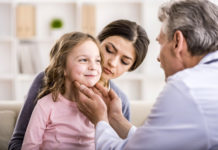Rise of Antipsychotics in Children
Researchers at Johns Hopkins explore the use of antipsychotics in children, finding a dramatic rise in off-label prescribing with little oversight or research into...
No Metabolic Risk for Antipsychotic-Naive Patients
An Austrian study of the baseline prevalence of metabolic abnormalities and changes following treatment with five commonly-used antipsychotic drugs (haloperidol, amisulpride, olanzapine, quetiapine or...
Why the Delay Between Psychotropics’ Immediate and “Therapeutic” Effects?
Writing in Neuron that antipsychotics' "functional consequences and the subcellular sites of their accumulation in nervous tissue have remained elusive," researchers from Germany and...
Schizophrenia Prevents Cancer; Antipsychotics May Cause It
In a review of all 59,233 individuals diagnosed with schizophrenia in Sweden between 1965 and 2008, researchers from Sweden and the U.S. identified 6137...
Off-Label Antipsychotic Use Among Children Soaring
Researchers from Philadelphia and Baltimore find, in a study of Medicaid records for 50 states and the District of Columbia, that antipsychotic prescribing to...
“Antipsychotic Use in Youth Without Psychosis: A Double-edged Sword”
This month’s issue of JAMA Psychiatry ran an editorial commenting on recent research revealing that the majority of youth prescribed antipsychotics have not been diagnosed with a mental disorder.
Family Economic Context Linked to Adolescents’ Antipsychotic Use
In a study of the Swedish Medical Birth Registry published in the British Medical Journal, researchers identified all 324,510 single children born between 1988...
Antipsychotic Drug Associated with Potentially Fatal Skin Rash
The US Food and Drug Administration is warning the public that the antipsychotic medication ziprasidone "is associated with a rare but serious skin reaction...
Children on Antipsychotics 50% More Likely to Develop Diabetes
Antipsychotic drugs increased the risk of children developing diabetes by 50%, and with an antidepressant added, their risk doubled.
Second-Generation Antipsychotics Just as Likely as Older Drugs to Cause EPS
In a study of an earlier randomized controlled trial of antipsychotics, researchers from Yale and the U.K found that second-generation antipsychotics were as likely...
Discussing The Meaning of Antipsychotics
Research published in the Journal of Psychiatric Practice finds that a "shared discussion of beliefs about medication between patient and care provider allows wider...
Nonwhites Twice as Likely to Receive Injectable Antipsychotics
Research published in the Journal of Clinical Psychiatry shows that of all 901 patients diagnosed with schizophrenia from July 2009 to June 2010 at a...
Prenatal Antipsychotic Exposure Causes Neuromotor Deficits
Researchers studying 309 6-month-olds at Emory University's Infant Development Laboratory found that infants prenatally exposed to antipsychotics showed significantly lower scores on a standardized...
Elderly With Dementia can be Withdrawn From Antipsychotics
The Cochrane Library reports that "many older people with Alzheimer's dementia and NPS (neuropsychiatric symptoms) can be withdrawn from chronic antipsychotic medication without detrimental effects...
Smoking Cessation and Psychiatric Drugs Cause the Most Suicidal and Homicidal Reactions
The popular smoking cessation drug Chantix is the medication that most frequently makes people feel suicidal or homicidal, according to figures gathered by the...
Antipsychotic Dose Reduction Linked To Long-term Improvements In First-Episode Schizophrenia Patients
Careful reductions in dosage levels of antipsychotic medications over time improved long-term rates of recovery and functional remission in patients diagnosed with a first-episode psychosis.
Children Diagnosed with ADHD Younger are More Likely to get Multiple Medications
New research demonstrates that children diagnosed with ADHD at younger ages are more likely than those diagnosed later to receive multiple medications within five years of their diagnosis.
45% of Children and Adolescent Inpatients Prescribed Antipsychotics
In a rare long-term study of antipsychotics used in children and adolescent inpatients, the Institute of Living in Hartford, CT followed 3,851 consecutive admissions...
Antipsychotics Rise in Youth, But Hospitalization Rates Stay the Same
Researchers from Tufts and Harvard find in a review of 233 medical charts of psychiatrically hospitalized youth at three points in time (1991, 1998...
Majority of Anorexia Patients are Prescribed Psychotropics Despite Lack of Data
Research from the medical schools of Harvard University and the University of Melbourne, reported in the December International Journal of Eating Disorders, found that...
Antipsychotics Triple the Risk of Diabetes in Children and Youth
Researchers from Vanderbilt and Columbia Universities and the FDA find that, through a retrospective cohort study of 28,858 patients of the Tennessee Medicaid program...
Antipsychotics are Common for the Mechanically Ventilated
Annals of Pharmacotherapy reports in a study of patients undergoing mechanical ventilation that 39% were given antipsychotic medication to prevent or treat delirium despite...
Atypicals Associated with Diabetes in Adults Without Schizophrenia or Bipolar Diagnoses
Writing in Evidence Based Mental Health, researchers from Harvard Medical School and Massachusetts General Hospital found that use of medication for diabetes was significantly...
Little Evidence on Effectiveness or Risks of Antipsychotics in Young People
Evidence-Based Mental Health reviews studies (from 1987 to 2011) of antipsychotics in people under 24 years old, finding weak evidence on comparative effectiveness of antipsychotics or...
Antipsychotics do not Result in Neurocognitive Improvement
Researchers in London and Spain, in a prospective, randomized, study of long-term (3 year) effects of first- and second-generation antipsychotics on neurocognition in 79...










